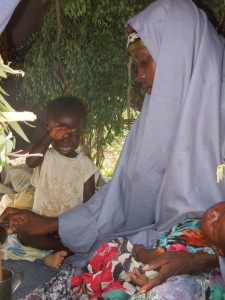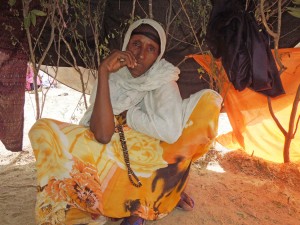Extreme Poverty
Resurgence of displaced families creates new crisis near Kenya-Somalia border


Maria Abdi and her children are among those recently arriving in the border town of Dhobley, Somalia.
Maria Abdi arrived in Dhobley, Somalia, with her five children and nothing but the clothes on their backs. She fled her hometown of Afmadow because there was no work there and the children were hungry. A relative paid her way to travel to Dhobley after Maria pleaded with them, having heard there was assistance here. But there was a charge for luggage and she couldn’t afford it, so she came empty-handed.
“I need everything a human being needs—all the basic necessities,” she said.
Maria’s family is among a new influx of arrivals in Dhobley, a transit point near the border for those traveling from Somalia to the Dadaab refugee camps in Kenya.
World Concern has been responding to the crisis in Dhobley since August, but staff members are seeing a sudden sharp increase in new arrivals. Ongoing drought and conflict in other parts of Southern Somalia are to blame for the influx. However, some people are returning from the refugee camps in Dadaab, citing insecurity and lack of food and other support in the camps as the reason for leaving.
“We visited the areas where families are settling in Dhobley and conditions are bad,” said World Concern Africa Director Buck Deines. “Most live in very temporary shelters, inadequate to protect them from the harsh weather. In some cases the shelters are nothing more than sticks and mosquito nets. We saw the interiors of several shelters, and in most cases, the families have no supplies of any kind.”
Deines estimates there are approximately 12,000 people that have settled in makeshift camps and are in immediate need of help. World Concern is planning to distribute vouchers that will supply families with a two-week supply of food, as well as emergency supplies like tarps, blankets, cooking pots, water jugs and more. However, additional funding is needed to respond immediately.
World Concern has been supporting people affected by the famine and drought in the Horn of Africa for nine months, and the recent increase in displaced families presents an urgent need.
Khayro Yussuf sits inside her shelter made from faded garments and held together by rope. Two metal cups are the only possessions inside her tent, except for an orange flask, which a relative uses to bring her tea.

Families arriving in Dhobley are living in temporary shelters like this one, made of sticks and a mosquito net.
She fled her village after three of her brothers and her uncle were killed in front of her. Khayro and her children came to Dhobley, fearing for their lives.
She received some food rations, but when she put it on a donkey cart, the owner of the cart took off with her only food. “When he realized I was not a resident and that I didn’t know where to go, he ran away with it,” she said.
Shortly after arriving, Khayro sent her son to Dadaab. “I was afraid he would be absorbed by militia … I never wanted my son to carry a gun or to join such kinds of groups,” she said.
Her daughter is staying with her in Dhobley. “If she is to die, she will die here with me,” said Khayro.

Khayro Yussuf fled her village after family members were killed in front of her. She arrived in Dhobley with few belongings and no food.